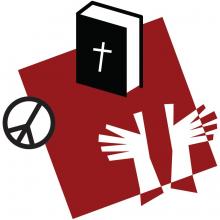Peace

Ten years ago, in March of 2003, Iraqis braced themselves for the anticipated “Shock and Awe” attacks that the U.S. was planning to launch against them. The media buildup for the attack assured Iraqis that barbarous assaults were looming. I was living in Baghdad at the time, along with other Voices in the Wilderness activists determined to remain in Iraq, come what may. We didn’t want U.S.-led military and economic war to sever bonds that had grown between ourselves and Iraqis who had befriended us over the past seven years. Since 1996, we had traveled to Iraq numerous times, carrying medicines for children and families in open violation of the economic sanctions that directly targeted the most vulnerable people in Iraqi society — the poor, the elderly, and the children.
I still feel haunted by children and their heartbroken mothers and fathers whom we met in Iraqi hospitals.
“I think I understand,” murmured my friend Martin Thomas, a nurse from the U.K., as he sat in a pediatric ward in a Baghdad hospital in 1997, trying to comprehend the horrifying reality. “It’s a death row for infants.”
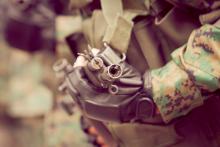
"Blessed are the peacemakers, for they shall be called sons [and daughters] of God.”
Matthew 5: 9 from the Beatitudes
I grew up watching casualty reports from the Vietnam War on TV. My Uncle Bill, a lieutenant colonel in the Air Force, was serving there. My family watched the news every evening to learn about the latest casualty reports. I was too young to understand the anxiety of my parents, but I felt the tension while Uncle Bill was deployed.
As an adult, it’s been a different story. I understand and experience things more fully and have an emotional connection to what I see and hear. That has been true for the last decade. Ten years ago, the Iraq War began. Ten years marked by conflict, violence, and loss. Ten years of debate about why we went to war and why we remained. Ten years dealing with death and injury – 4,488 U.S. deaths and 32,321 soldiers coming home with significant injuries. Suicide rates of soldiers are so high it is impossible to ignore – some while in Iraq and others after returning home. Traumatic brain injuries, grieving families, moral injury, and multiple limb loss are just a few of the constant reminders of the tremendous costs of war. The toll on the nation’s economy has been long lasting as well. The jobless rate among veterans is staggeringly high.
The human toll has been significant. But military personnel aren’t the only causalities of this war. Numbers vary, but statistics tell us more than 100,000 Iraqi citizens also have been killed and nearly 3 million have been displaced.
These figures cannot be ignored. And they are the results of war.
Driven by our moral call to protect each member of our society, people of faith have been outspoken about the need to craft meaningful legislation to reduce gun violence. This week, Mayors Against Illegal Guns released an ad featuring a diverse group of religious leaders, including Sojourners CEO and President Jim Wallis, leaders to demand that Congress make common-sense reforms to our nation’s legislation that is failing to keep us safe.
The faith community continues to speak loudly and clearly about the moral urgency to address this issue. The only question is whether Congress will listen and finally address the epidemic of violence that plagues our nation.

As the College of Cardinals begins its conclave today in Rome to select the next Pope, I find myself intensely interested in the outcome. Since I am an Anabaptist, a child of the “radical” Reformation, I’ve spent some time reflecting on why that is so.
First, the Roman Catholic Church is an unbroken link to the first century Roman church for all Christians, no matter our denomination. Before the so-called “Great Schism” between the eastern and western church in 1054, the Christian church led from Rome was THE primary Christian church. No matter if we are Eastern or Western Christians, no matter how Protestant or Anabaptist some of us are, the Church of Rome is still in some way our Mother church.
Second, it remains the largest Christian tradition in the world.
THIS JUST IN — horrific news from our friends in Kabul. Over the weekend two kids, age 7 and 8, were killed by NATO forces while herding cattle in the Uruzgan Province in Afghanistan.
The Afghan Peace Volunteers, with whom Shane visited a few weeks ago, took to the streets in nonviolent protest.
They were accompanied by a couple of cows, as a reminder of the innocence of these children who were killed alongside their livestock.
They carried signs that read: “We are those 2 children.” Here is a video they sent us:

While everyone was blowing up the Twittersphere decrying the injustices of the Oscars, as movies like Argo walked away with Best Picture honors, I was sitting in a Philadelphia hotel lobby trying to chew on everything I’d heard and seen at this year’s Justice Conference.
The two-day event brought together more than 5,000 people to promote dialogue around justice-related issues, like poverty and human trafficking; featured internationally acclaimed speakers such as Gary Haugen, Shane Claiborne, and Eugene Cho; and exhibited hundreds of humanitarian organizations.
While there is certainly more thinking and processing to be done, here are four things that stood out.
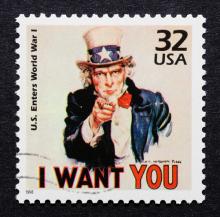
Recent news, including the Oscar nomination of The Invisible War and the looming sequester, which threatens drastic cuts in defense spending, doesn’t sound good for military recruiters. But recruiters are still active at my local high school, offering freebies and making promises. For six years I’ve been visiting the high school to encourage students to stop and think about their choices.
I’m not a biblical literalist, but I take the commandments to love your enemies, not to kill and not to overcome evil with evil seriously. I don’t make this argument at the school; it would violate their rules about religious expression, and I think it might alienate our neighbors who believe simultaneously in Jesus, the right to bear arms, and the need to fight ‘terrorists.'
I also have a concern for the truth. Many young people enlist in the armed forces without understanding what they’re getting into. My county is rural and poor; jobs are scarce. Many students who lack money or grades to make college a viable option are attracted by the promise of steady work, sign-up bonuses, travel opportunities, money for education — and sometimes, it seems, by clearly false promises.

The drone operators sit at consoles on military bases around the U.S. They track their targets and when the moment is right, they send the command to fire. And then people die.
Drones have been in the news a lot over the past month as Congress has considered the nomination of John Brennan to head the Central Intelligence Agency (CIA). Brennan has been the chief architect of the drone policies of the Obama administration.
The constitutional questions have gotten quite a public airing, but drones raise deeper moral questions about what constraints there are on weapons of war.
Yes, drones are efficient, effective, and economical. But what do they do to the soul of this nation, to the psyches of those who push the buttons from half a world away? If they are moral for the U.S. to use at will in any nation of the world, are they moral for other nations to use against us?
For those who are students of Africa, the Caprivi Strip of Northern Namibia brings memories of the awful border wars and independence struggles of the 1970s and 80s. Perhaps the lessons apply to Israel and Palestine.
Ironically, one of the last and longest, most peaceful and unpolluted rivers in the world is the Okavango. It is the border between Namibia and Angola where still today a long stretch of the north bank Angolan farmland is mine infested. Large breem and tiger fish jump, and magnificent fish eagles take flight from trees on the Namibian bank and wing to large dead trees in Angola where hippo provide background music with loud braying. The behemoths make their way back and forth and often spend the early evening hours lounging on the beach in front of the main buildings of the River Dance Lodge near Divindu on the southern shore.
This gently lapping, wide, drinkable stream — that creates in nearby Botswana the amazing Okavango Delta — is bordered by Angola, Namibia, and Botswana. The crystal clear ribbon of nearly 500 miles of uninterrupted resource runs just a few yards under my feet a quarter of a mile across from where the Angolan fields and forests were the hiding place for Jonas Savembi before he was killed in 2002. His South African- and American-supported troops were routed by Jose Eduardo Dos Santos, the socialist leader of UNITA and president since 1979. We can see homes there that have been vacant since the war because local farmers fled the fighting. Kavanaga tribal tradition requires people to not dwell in places where violent deaths have occurred. Ethnic tribal relations are still tense between the Portuguese-speaking Angolans and the English/German-speaking Namibians, even though they are from the same ethnic group. The horrific memories of vicious cross-river raids and shelling persist.

John McCain angrily insisted on “right” and “wrong” answers to his questions of Chuck Hagel yesterday. As a theologian and a religious leader, I want to say that John McCain is “wrong.”
I watched the hostile questions that Sen. McCain asked Hagel in the hearings on his nomination for Secretary of Defense. The angry attacks from McCain were about the Iraq War, for which McCain was one of America’s leading advocates. Hagel had previously called the war in Iraq the biggest American foreign policy mistake since Vietnam. Obviously furious, McCain tried to force Hagel to say the last “surge” in Iraq, which McCain had made his cause, was right after all. Despite the aggressive and disrespectful questioning from his former “friend,” Hagel wouldn’t submit to McCain’s demands and said these questions would be subject to history — and to theological morality, to which John McCain has never submitted his views. In fact, his repeated desire to invade other people’s countries is offensive moral hubris.
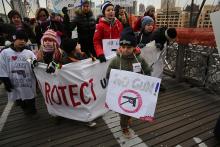
Much has been said, since the massacre at Newtown, Conn., about our American culture of violence. It is no exaggeration. In 2012, the United States had three mass shootings within six months. According to a study published in the Washington Post, our nation’s gun murder rate is roughly 20 times the average of all other developed countries.
We should not be surprised. Not only have we created a culture of violence, we glorify violence in our movies, television shows, and video games. Even in pro sports, players increasingly settle disagreements on the court or field with physical altercations, reinforced by the cheers of raved fans.
The huge surge in gun sales, after President Barack Obama announced his intent to have Vice President Joe Biden make recommendations to curb gun violence, attests to the misguided fears of many Americans.
We have a paranoid citizenry who, like Sen. Rand Paul (R – Ky.), mistakenly falls into the delusion that arming more people with guns is the answer.
So here America is, coping with this assault on our sensibility, at a time during the year when we celebrate the teaching of the great civil rights leader the Rev. Dr. Martin Luther King, Jr. It was King who successfully applied the force of nonviolent resistance to end segregation in America, and it is his voice we must listen to in this time of increasing violence in our culture.
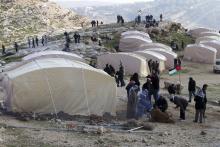
Last week, while most of Israel was focused on increasingly extreme rhetoric surrounding the upcoming elections and most Americans were listening to angry debates about guns and fiscal responsibility, a remarkable thing happened. A few dozen Palestinians captured the world’s attention quietly and peacefully.
Their methods were simple and witty. Following the example of Israeli settlers, they established “facts on the ground.” The group of Palestinians quietly hiked up a barren hillside in cold, wet weather and pitched tents, declaring themselves part of the new village of Bab al-Shams, or Gate of the Sun, a name taken from the novel by Lebanese writer Elias Khoury.
Their village was established on private, Palestinian land and the landowner (who publicly displayed his Ottoman era deed) gave them permission to camp there. But that particular piece of land is also known on an Israeli development plan map as “E-1” and came to the attention of the world recently when Prime Minister Netanyahu announced plans to annex the land for Israeli settlements. Many believe that move, which would essentially bifurcate the West Bank, would be the deathblow to the “Two State Solution.”
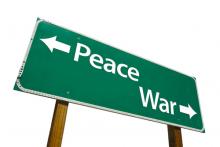
IN THE U.S., the Cold War has served to justify a permanent wartime economy, blacklisting and surveillance of dissenters, and military interventions against smaller and weaker nations from Vietnam to Nicaragua. In the Soviet Union, it has been used to excuse a permanent state of economic austerity, the imprisonment and torture of dissenters, and military interventions from Hungary to Afghanistan. And on both sides the Cold War has provided the ideological underpinning and political momentum for a nuclear arms race that threatens the future of the entire human family. ...
As Christians our faith, security, and hope for a peaceful world can only be placed in the one true God, who is the creator and sustainer of all life and the Lord of history. The first and most essential commandment forbids us to trust the fate of God’s earth and generations unborn to the creations of finite, fallible, and fallen human beings.

LAST OCTOBER, A historic breakthrough for peace took place in Mindanao. In this region in the southern Philippines, an armed conflict has persisted for more than four decades, killing 120,000 people and displacing millions. Now, after 15 years of peace negotiations between the government of the Philippines and the Moro Islamic Liberation Front, both sides have signed a framework peace agreement.
For generations, Moro (as traditionally Islamic ethnic groups are called here) and indigenous peoples in Mindanao have been politically, economically, and socially left out and marginalized in the Philippines. It is in this context—and the collective desire of the Moro people in Mindanao for self-governance—that both the armed conflict and the peace negotiations took place. The agreement signed in October outlines a pathway toward the establishment of a political entity, Bangsamoro, that will be autonomous, although not fully independent of the Philippines.
The framework agreement is a welcome consolidation of a long-term peace process that has encountered significant challenges, including periods of lackluster support from the international community and a less-than-successful 1996 peace agreement with the Moro National Liberation Front (from which the Moro Islamic Liberation Front is a breakaway group).
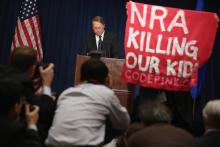
What does the birth of the baby Jesus 2,000 years ago have to offer the violent, troubled world we live in? Or what would Jesus say to the NRA?
I want to suggest — a lot. A whole lot.
Jesus entered the world from a posture of absolute vulnerability — as an unarmed, innocent child during a time of tremendous violence. The Bible speaks of a terrible massacre as Jesus was born, an unspeakable act of violence as King Herod slaughters children throughout the land hoping to kill Jesus (which the church remembers annually as the massacre of the Holy Innocents).
Perhaps the original Christmas was marked more with agony and grief like that in Connecticut than with the glitz and glamour of the shopping malls and Christmas parades. For just as Mary and Joseph celebrated their newborn baby, there were plenty of other moms and dads in utter agony because their kids had just been killed.
From his birth in the manger as a homeless refugee until his brutal execution on the Roman cross, Jesus was very familiar with violence. Emmanuel means “God with us.” Jesus’s coming to earth is all about a God who leaves the comfort of heaven to join the suffering on earth. The fact that Christians throughout the world regularly identify with a victim of violence — and a nonviolent, grace-filled, forgiving victim — is perhaps one of the most fundamentally life-altering and world-changing assumptions of the Christian faith. Or it should be.
So what does that have to do with the NRA? Underneath the rhetoric of the gun-control debate this Christmas is a nagging question: are more guns the solution to our gun problem?
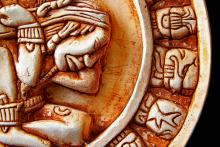
For a child has been born for us,
a son given to us;
authority rests upon his shoulders;
and he is named
Wonderful Counsellor, Mighty God,
Everlasting Father, Prince of Peace.
~ Isaiah 9:6
On the flight home from Connecticut, where we’d buried my beloved father a few days before Thanksgiving, I watched the film Seeking a Friend for the End of the World and dissolved into a wailing heap of tears and snot.
The premise of the uneven dramedy starring Steve Carell and Keira Knightley is this: An massive asteroid named Matlilda is on a collision course with planet Earth and in three weeks’ time, the world will come to an end. The main characters and others decide how – and with whom – they want to spend the last days of their lives.
Given recent events, this led to some soul searching on my part. If I had three weeks to live, what would I do? Where would I go? Who would I want to make sure I saw? With whom would I want to share my last breaths?
For most of my life the answer has been the same: I’d want to be with my family and, in particular, with my father.
Which is why I ended up bawling my eyes out for the last 90 minutes of the flight home to Los Angeles, much to the dismay of the fellow in the middle seat next to me.
If I had three weeks to live today, I wouldn’t be able to spend any of those moments with Daddy.
He’s in the More, now. On the other side of the veil. In Heaven. Resting in peace. With Jesus.
And I will have to wait until my earthly life ends to see him again face-to-face.
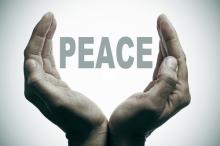
Whoops. I was joking with a co-worker today about writing a subversive post about how the song “Do You Hear What I Hear” is an extended metaphor for the Roman Empire’s takeover of Christianity, contorting Jesus’ message for its own ends. “Listen to what I say,” orders the unnamed king, as he urges adoration of Jesus and calls for peace — Pax Romana.
I did a quick Wikipedia search, and learned exactly how wrong I was. Rather than a subversive message about the twisting of the Gospel, “Do You Hear What I Hear” was actually a call for peace during the turbulence of the 1960s.
I mean, think about it: the song talks about the humbleness of the announcement of Jesus’ birth – only the night wind and the little lamb have heard about it. This whisper gets passed up to ever-increasing degrees of authority (a grassroots movement if we’ve ever seen one), until the king himself is calling for peace.

I don’t know about you, but I’m pretty sure I have sung “O Little Town of Bethlehem” every year on Christmas Eve for my entire life. But I believe this carol’s lyrics, specifically the words of the first verse, invite a little more thought than we normally give them.
O little town of Bethlehem
How still we see thee lie
Above thy deep and dreamless sleep
The silent stars go by
Yet in thy dark streets shineth
The everlasting light
The hopes and fears of all the years
Are met in Thee tonight
For now let’s ignore the historical inaccuracies of the song, and focus on what the words mean, especially the last four lines. How beautiful is it that through the dark world a light came to bind together the hopes and fears of all the years (I choose to see it as past and future) in Jesus?
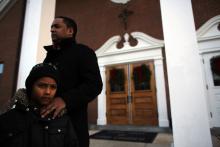
One commentator suggested that it was precisely because God was not there that this heinous act happened. Gov. Mike Huckabee claimed we should not be surprised to see this kind of violence since we have removed God from our schools and our society. His sentiment is to say, “God is NOT here.” If that is the case, then it surely can explain the existence of pure evil that we saw displayed on Friday.
However, thinking like that of Gov. Huckabee suggests that we somehow have the power to remove God from our schools and our society. This kind of God is quite small, weak, and impotent — one that is dictated by the mere whims of humanity. This is not the God of whom Matthew spoke.
Matthew spoke of the Almighty God fully embodied and revealed in the person of Jesus. So much so that he claimed he was Immanuel: God with us. He is here not in spite of the pain, nor did he come to explain it away. God is here in the midst of our suffering.
The hope of Advent is that God responded to the suffering of humanity by entering into it with us. He did not stand outside of it and look in with a wincing face and hope that everything would somehow work out. Nor did he see humans who removed him from their schools and societies and say, “Well fine, then, have it your way!” Not at all.
